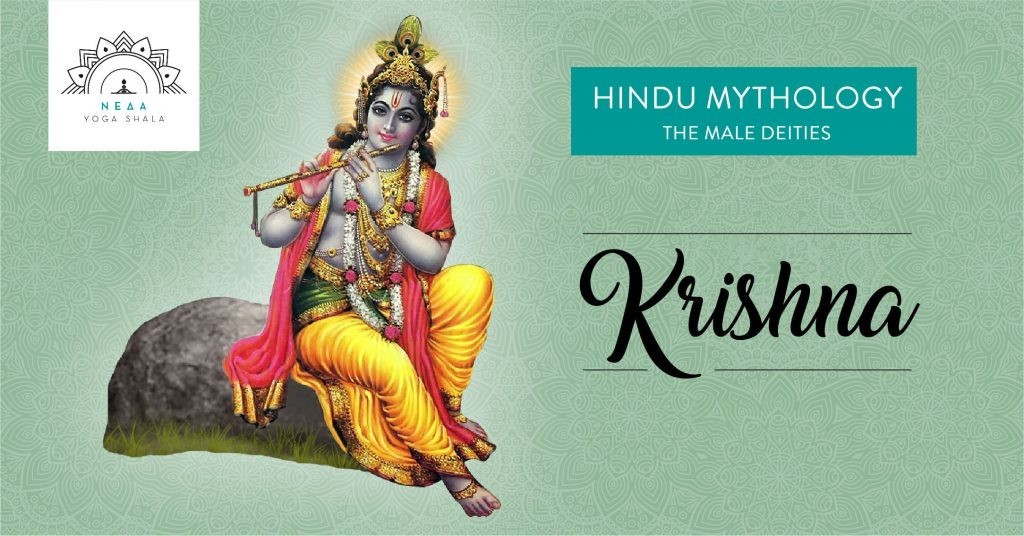
Krishna
In Indian mythology, every time the world was up against a great threat, the Gods would often ask for Vishnu’s help. In his turn, in order to be able to intervene, he would often take on various incarnations (avatars), with most texts referring to 10, of which 9 have already appeared. So, the 8th incarnation was in the form of Krishna, and by many, it is described as the most human and charismatic.
Κrishna’s younger years
Krishna was the son of Vasudeva, the great leader of an Indian tribe and Devaki. When Krishna was born, his father secretly took him to a nearby village, so that he would grow up in safety in a community of cow herders, and he would be protected from his oppressive uncle Kansa, who (after hearing a prophecy that one of his nephews would kill him), was murdering all of his sister’s Devaki babies. So, Krishna had a serene and simple childhood in the pastures, playing with his friends, bare-footed and carefree. He turned out to be a child with exceptional abilities. Since he was a baby, he would vanquish all the demons his uncle would send to kill him, and he was always saving the village from various troubles. At the same time, he was the very soul of happiness, life and playfulness, and he charmed anyone who met him. Even since he was little, with the melodies of his flute (with which he is often depicted) he would hold night-long ecstatic dancing feasts, and through that, he would guide everyone around him into transcendental states of consciousness.
He was a symbol of companionship, generosity, compassion and love. He is often described as the “ideal lover” and was surrounded by women all the time (the “Gopis”), who would arrive from inside the woods when they heard his flute and would dance and sing by his side. Because all of them wanted to hold his hand, Krishna, full of sincere love and tenderness, would multiply himself to keep them happy, and so, all of them felt that they were holding the hand of the real Krishna. His favorite one was Radha, with whom he shared a beautiful love story.
Krishna and Bhagavad Gita
Krishna’s life is described extensively enough in the great epic of Mahabharata, and many of his beautiful teachings are included in the part called the “Bhagavad Gita”, which refers to the battle between 2 families, for the kingdom domination. Krishna served as the charioteer of Arjuna, the leader of one of the families. Before the battle, when Arjuna saw his relatives at the opposite camp, he got filled with fear, doubt, and cowardliness. So, he turns to his wise charioteer for help and Krishna provides valuable advice about a warrior who loses his courage.
Among many other things, Krishna, through his words to Arjuna, communicates the importance of acting and of this action being in accord with Dharma, a notion that often appears in the philosophical texts. Dharma is about the laws governing the operation and structure of the world and society, as well as our own personal duty to adopt a harmonious behavior. Krishna advices that we explore our self, so that we find our own purpose in society and fight for it with courage and confidence. Dharma is being aware of our duties and responsibilities, in the same way that Arjuna was a ksatriya (warrior) who had to fight.
One’s own Dharma is best, even if it has no value, compared to another’s well fulfilled Dharma B.G. 3.35
And what is our Dharma?
No one can tell you what your Dharma is. This is something you have to find out on your own… In order to find what our Dharma is, we need to be aware of where we stand, what we take from life and what we can offer in relation to the totality of existence. That includes interacting with other people, the society, the mind, our beliefs, the ways we express ourselves and so on. So, begin in any way you can, and first, know yourself. The command ‘know thyself’ is the first step for discovering the Dharma…Swami Niranjanananda Saraswati
In his advice, Krishna among other things emphasizes the importance of acting with selflessness and without ulterior motives. Not to isolate ourselves in the caves and renounce the world, but on the contrary, to live in the world with internal renunciation. In that case, everything in life becomes a beautiful ceremony, a service, an offering. How would our life be if we were acting in the best way we could, without any personal motives? What would remain if we’d set our expectations aside? How open would we be to whatever appears in front of us?
Do the work that you have to do, without never becoming attached to it. B.G. 3.19
The one who has abandoned all attachment to the fruit of his labor, is always satisfied, without any dependencies, and, even when occupied with work, he truly does nothing… He is pleased with whatever occurs… even when working, he is not engaged to anything. B.G. 4.20
Krishna invites us to remember that we live in a world that constantly changes beyond our control, and our best option is to remain strong inside, wise and stable, so that we can play with Leela’s perpetual change, fall in love, work and contribute, offer generously, seek out, dance in the fields and play our flute.
Krishna’s Yoga is a path of interacting with life, full of compassion, self-awareness, tenderness, selflessness, surrender, heart, music and above all, love!